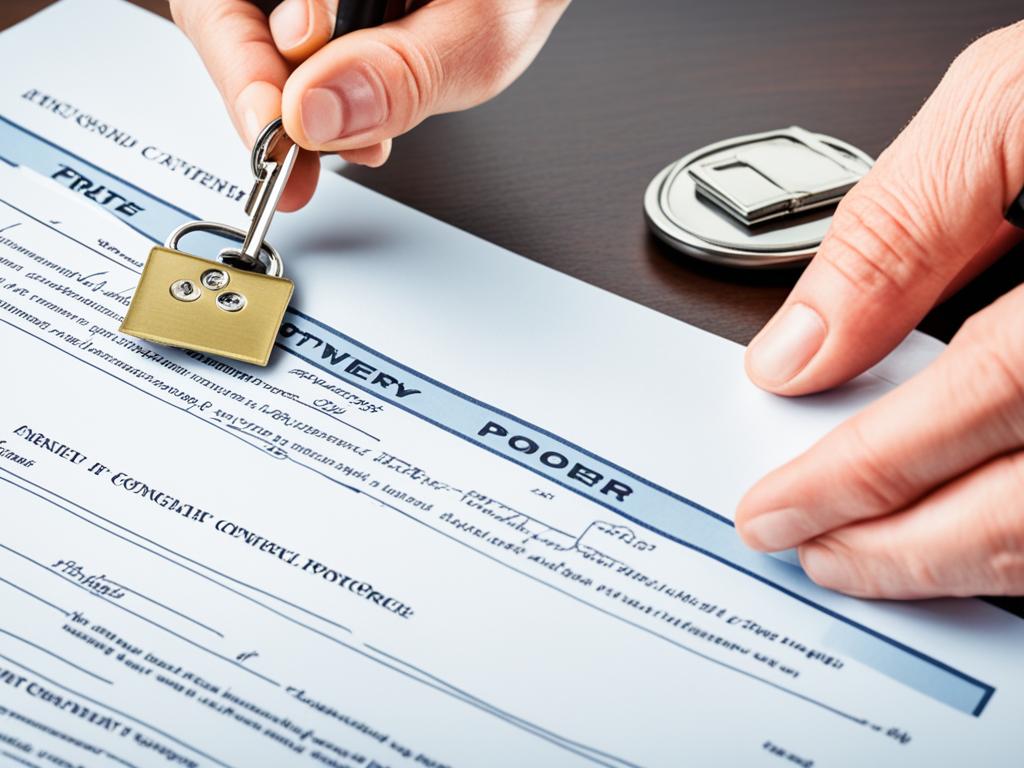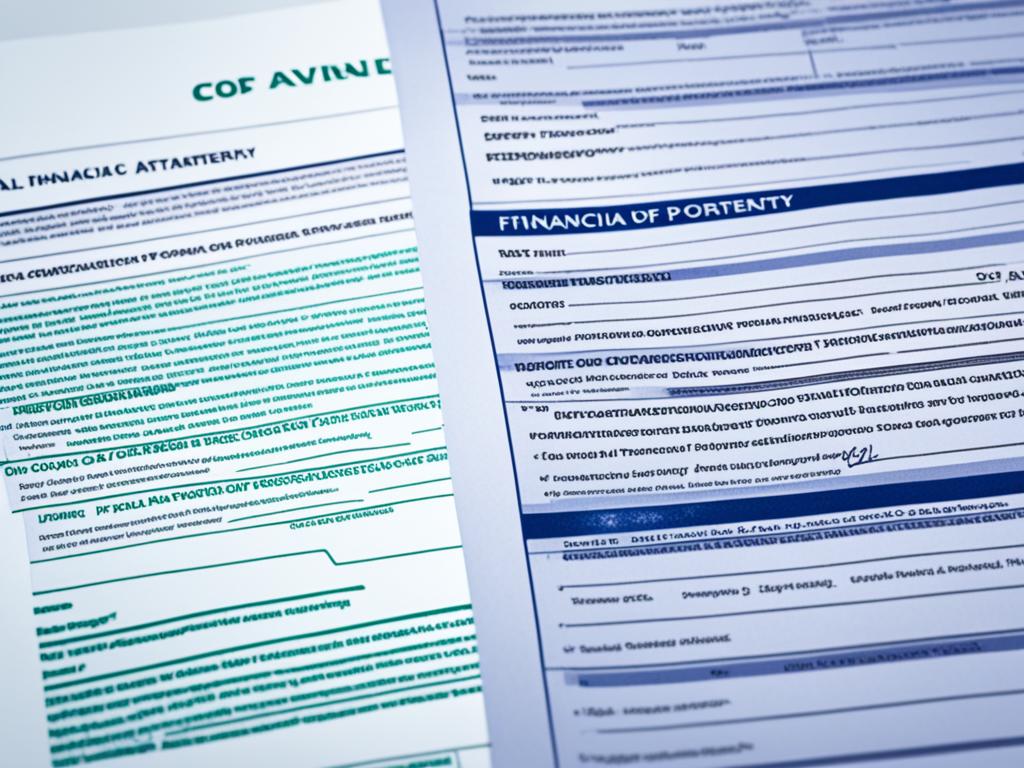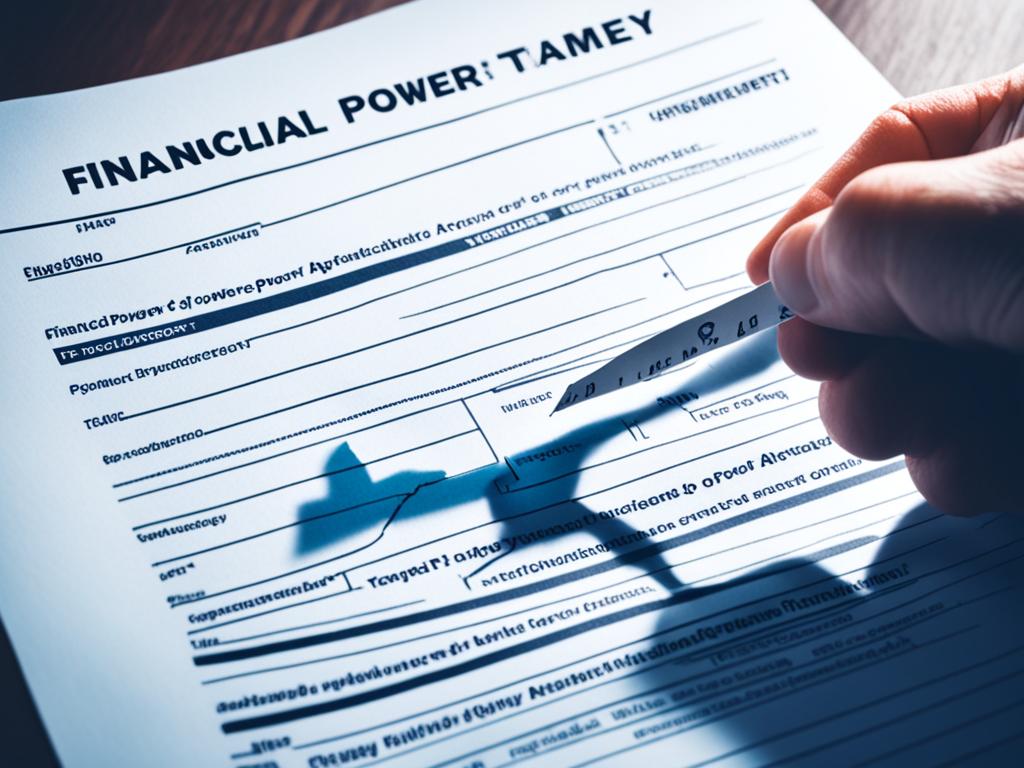
Understanding the Role of a Financial Power of Attorney
A financial power of attorney is a key legal document. It gives someone the right to handle your finances and make important financial choices for you. This tool lets an appointed attorney-in-fact manage your assets, pay bills, and take care of financial matters if you can’t do it yourself.
By knowing how a financial POA works, people can make sure their finances are looked after when they need it most. This gives peace of mind and protects their financial well-being.

The financial power of attorney is a vital part of estate planning. It gives the attorney-in-fact the legal right to act for you in financial matters. This includes managing your investments, paying bills, accessing bank accounts, and making other important financial decisions.
By picking a trusted person as your attorney-in-fact, you can be sure your assets and financial interests are taken care of. This is true even if you’re unable to do so because of illness, injury, or other serious situations.
What is a Financial Power of Attorney?
A financial power of attorney is a legal document. It gives someone, called the “attorney-in-fact,” the right to manage the money matters of another person, the “principal.” This is very useful when the principal can’t handle their finances anymore.
Definition and Purpose
This document lets a trusted person take care of the principal’s money stuff. They can manage bank accounts, pay bills, and make investment choices. It makes sure the principal’s money matters are taken care of, even if they can’t do it themselves.
Legal Requirements
The rules for making a financial POA change based on the state laws where the principal lives. The document must be signed by the principal and have a witness or a notary to be legal. Some places might ask for more, like the principal being mentally okay or certain words in the document.
It’s key for people to check their state’s rules for financial power of attorney. This makes sure the document they make is legal.

Selecting an Attorney-in-Fact
Choosing the right attorney-in-fact is key for managing your finances. This person will make important financial decisions for you. It’s vital to pick someone you fully trust. They will handle your fiduciary responsibilities, acting in your best interest and safeguarding your assets.
Here are some key points to consider when picking an attorney-in-fact:
- Trustworthiness and integrity: Look for someone known for honesty and good judgment.
- Financial acumen: Your attorney-in-fact should know a lot about managing money and making smart choices.
- Availability and commitment: They should be ready and able to put in the time needed to manage your finances well.
- Geographical proximity: Having someone nearby can make handling financial matters easier.
- Shared values and communication: It’s important to pick someone who values the same financial goals and can talk openly with you.
The attorney-in-fact you choose is crucial for protecting your financial health. Take your time to think about your options. Pick someone who can handle the fiduciary responsibilities of this key role.

Powers Granted to the Attorney-in-Fact
When you name a financial authority through a power of attorney, you give them big powers. They can manage your finances and assets. They can make decisions for you and follow their fiduciary responsibilities.
Managing Finances and Assets
The attorney-in-fact can do many financial tasks, such as:
- Accessing and managing your bank accounts
- Paying your bills and managing your investments
- Buying, selling, or renting property on your behalf
- Collecting government benefits or retirement payments
- Filing your taxes and communicating with the IRS
Fiduciary Responsibilities
As a financial authority, the attorney-in-fact must act in your best interests. They must make choices that help your financial health and avoid conflicts of interest. They are responsible for:
- Maintaining accurate records of all transactions
- Avoiding self-dealing or using your assets for their own benefit
- Consulting with you (or your legal representative) on major decisions
- Communicating transparently about the management of your asset management

The power of attorney document outlines the attorney-in-fact’s powers and duties. It’s important to pick someone you trust to handle your fiduciary responsibilities.
Financial Power of Attorney and Incapacity
When you can’t manage your finances, a power of attorney is key. It lets someone you trust handle your money matters. This includes keeping your assets safe if you’re sick or hurt.
Planning for Incapacity
Planning ahead is smart. With a financial POA, someone can take care of your money for you. They can pay bills, manage money, and make investment choices.
Activation and Limitations
A financial power of attorney kicks in when a doctor says you can’t manage your finances on your own. But, what happens next depends on your state’s laws. It’s important to know what your chosen person can and can’t do with your money.

Knowing how a financial POA works helps you protect your money. It makes sure your wishes are followed, even when things get tough.
Revoking or Modifying a Financial Power of Attorney
Sometimes, you might need to cancel or change a financial power of attorney. This is important if you want to take back control of your finances or update the agreement. Knowing how to do this is crucial for a smooth process.
Common reasons for canceling a financial POA include changes in your life or finances, losing trust in the person you named, or no longer needing the power of attorney. It’s vital to follow the right legal steps to make sure the cancellation is valid. This way, it will be accepted by banks and other important groups.
Revoking a Financial Power of Attorney
To cancel a financial POA, you must follow your state’s laws. Here’s what you need to do:
- Fill out the legal papers, like a revocation form or a letter saying you’re revoking the power of attorney.
- Tell the person you named as your attorney-in-fact in writing that you’re taking back their power.
- Let any banks, agencies, or others know that they can’t share your financial info or assets anymore.
- Make sure the cancellation is recorded and filed with the right authorities, as your state’s laws say.
Modifying a Financial Power of Attorney
Changing an existing financial power of attorney is similar to canceling it. Here’s what you should do:
- Decide what changes you want, like picking a new person or changing what they can do with your money.
- Talk to a lawyer to make sure you’re doing it right and following your state’s rules.
- Fill out the needed papers, like an amendment or a new power of attorney form, and go through the same steps as canceling the old one.
Canceling or changing a financial POA is a big step in keeping control of your money. By understanding the process and following the legal steps, you can make sure everything goes smoothly. This helps protect your interests.

Conclusion
A financial power of attorney is a key legal document. It lets someone manage your money if you can’t do it yourself. By picking an attorney-in-fact, you make sure your money matters are taken care of. Your assets stay safe, and your wishes are followed, even when things get tough.
We’ve looked at what a financial power of attorney is and why it’s important. We talked about the legal steps, choosing the right person, and what they can do. We also covered the need to plan for when you might not be able to make decisions and the limits of this document.
Having a financial POA gives you peace of mind. It protects your money and lets your chosen person make smart choices for you. When you’re thinking about estate planning and managing your money, remember how important a financial power of attorney can be for your future.
FAQ
What is a financial power of attorney?
A financial power of attorney is a legal document. It gives someone else, called the attorney-in-fact, the right to handle your finances. They make financial decisions for you if you can’t do it yourself.
What are the legal requirements for a financial power of attorney?
The legal needs for a financial power of attorney change by state. You usually must sign and notarize the document correctly. Always follow your state’s laws when making one.
How do I select an attorney-in-fact?
Choosing an attorney-in-fact is very important. Pick someone you trust who can handle your finances well. They will manage your money and assets for you.
What powers does the attorney-in-fact have?
The attorney-in-fact can manage your finances and assets under a financial power of attorney. They can pay bills, handle investments, and make financial choices for you. They must act in your best interests.
How does a financial power of attorney work in the event of incapacity?
A financial power of attorney kicks in when you can’t manage your finances yourself. The attorney-in-fact takes over to manage your money. The document should say when it starts working, which can differ by state.
Can I revoke or modify a financial power of attorney?
Yes, you can cancel or change a financial power of attorney. But, how to do it and the legal steps vary by state. Make sure to follow the right process and make sure it’s legally okay.



I appreciate the emphasis on planning ahead. It’s essential to consider our financial well-being, even in uncertain times
Nice article 👍,it is well detailed for anyone choosing a financial attorney.